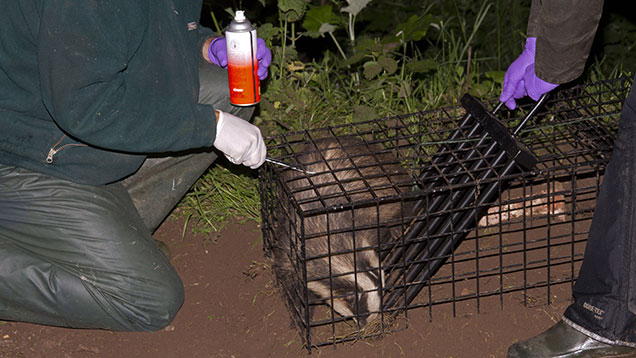Scientists call for tougher cattle measures to curb TB
 © REX/FLPA / John Hawkins
© REX/FLPA / John Hawkins A group of 26 scientists and vets has written a letter to the prime minister urging the government to introduce tougher cattle-based measures to curb bovine TB in England.
The open letter states that while Wales has nearly halved the number of cattle slaughtered due to bovine TB over the past five years, there has been “little change to the levels of the disease in England during this time”.
Wales has reduced the number of cattle slaughtered each year with the numbers killed falling from 11,671 in 2009 to 6,102 in 2013 and the decline is continuing. Similarly, the number of new herd incidents in Wales since 2008-09 has reduced by about 36%.
The group says the Welsh government has achieved this reduction by imposing strict annual testing and mandatory pre-movement testing across Wales since 2010 and enforcing “robust biosecurity”, among other cattle-focused measures.
By contrast, the letter said, the UK government and Defra had spent “considerable time and effort on the promotion of badger culling as a means of controlling bovine TB in England”.
See also: No badger cull rollout before 2015 general election, says Eustice
From the information published by the UK government so far on the badger cull pilots, it was not clear whether the forecast net reduction of 12-16% in new herd incidence of bovine TB over the next nine years would be achieved or how this will be measured, the letter added.
The group also points out that in the west of England, which has been under annual and pre-movement testing since 2010-11, the number of cattle slaughtered due to TB fell by 12% between 2012 and 2013 and this decline is continuing in 2014.
However, unlike Wales, England still has substantial parts of the country, with significant cattle populations under four-year testing regimes and not subject to mandatory pre-movement testing in so-called “low-risk areas”.
“If we are to control bTB in England, as Wales is showing it is able to do, we consider that a fundamental change in emphasis and direction is needed,” the letter said.
“The time, effort and resources directed at the badger cull should be re-directed into a) a TB Health Check for England to establish the true extent and distribution of the disease in our cattle herds; b) considerably more testing in the low-risk area with the implementation of nationwide annual testing and c) the introduction of mandatory pre-movement testing and risk-based trading across the whole country.”
The letter concluded by urging the government to implement an “intensive cattle testing programme” across England to achieve a “substantial reduction in bovine TB”.
“The government is right that we need to tackle the reservoir of disease in wildlife. But more work needs to go into research to identify infected badger setts rather than the current approach to culling.”
Nigel Finch, beef farmer
The signatories included: wildlife ecologist Dr Chris Cheeseman, Prof Tim Coulson, a former member of the Independent Expert Panel, Prof Rosie Woodroffe, senior research fellow at the Institute of Zoology in London and Mark Jones, veterinarian and executive director of the Humane Society International UK.
Gloucestershire livestock farmer Nigel Finch, who is also vice-president of the Conservative rural affairs group, has added his name to the letter. He operates a closed herd of 350 beef cattle at Woodlands Farm in Chedworth, Cheltenham.
Mr Finch said: “The biggest issue of all is transmission of the disease because of the movement of cattle. Therefore, the government must introduce a stricter testing programme.
“The government is right that we need to tackle the reservoir of disease in wildlife. But more work needs to go into research to identify infected badger setts rather than the current approach to culling.
“We also need to be vaccinating cattle. The government has been saying that vaccination development was 10 years away for the last 30 years. The point is, that the vaccination and associated Diva test is already available.
“The only reason it has not been accepted is mainland Europe will not accept vaccinated animals. That wouldn’t make any difference to my business.”
